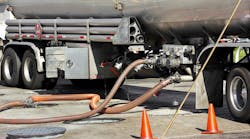The Pipeline and Hazardous Materials Safety Administration (PHMSA) has withdrawn a decade-old rulemaking proposal that would have stopped flammable liquids from being transported in unprotected product piping (generally referred to as “wetlines”) of new and existing cargo tankers.
According to the announcement in Wednesday’s Federal Register, the notice of proposed rulemaking (NPRM) “Hazardous Materials: Safety Requirements for External Product Piping on Cargo Tanks Transporting Flammable Liquids” is being pulled because of a mandate in the new highway bill, the FAST Act.
The rule would have required the piping be protected against accident or bottom damages, or designed to be emptied of flammable liquid. PHMSA also issued this proposed requirement to fully address a long-standing National Transportation Safety Board (NTSB) Safety Recommendation.
But the Government Accountability Office (GAO) published a report critical of the methodology and data used to support the rulemaking, and GOA noted that PHMSA's analysis had not adequately addressed the market uncertainty with regard to the technology to be used to address the safety hazard.
In comments on the proposal, opponents contended that wetlines are not a safety risk, citing PHMSA's own statistics that the frequency of wetlines incidents is low and the frequency of incidents that lead to injury or death is extremely low.
While PHMSA is withdrawing the rulemaking in accordance with the FAST Act, the agency will continue to examine this issue, particularly by monitoring flammable liquid wetlines incidents, “in consideration of any future actions,” the notice states. These likely future actions include “non-regulatory initiatives.”



